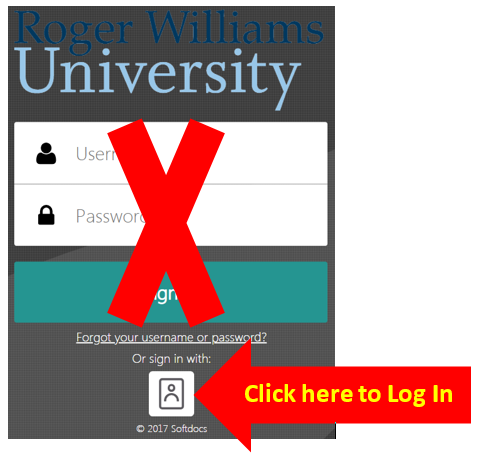Pro Bono ELR Forms
To receive credit for completion of RWU Law's 50-Hour Pro Bono Experiential Learning Requirement, students must report and request approval of hours to the Feinstein Center via Etrieve by the required deadlines. Students must use Etrieve to report each placement or project that the student intends to use towards their 50-hour requirement.

All pro bono experiential learning must be reported online using Etrieve.
Important: To log in to Etrieve, you must first click on the small “Or sign in with” icon located at the bottom center of the screen, which will create a prompt for you to sign in using your RWU Law 0365 login credentials.
For the New York Pro Bono reporting requirements, please refer to the New York Pro Bono rule section.
Below are some examples of pro bono opportunities that qualify under the RWU Law pro bono graduation requirement:
Unpaid public interest internships with:
- Legal services organizations;
- Non-profit legal organizations;
- Public defender offices;
- Prosecution offices;
- Government agencies; or
- Judges or court attorneys.
- Pro bono experiences working alongside an attorney doing pro bono or work on a court-appointed criminal case.
- Participating in RWU Law's Alternative Spring Break program.
- Participating in RWU Law's Pro Bono Collaborative projects such as Street Law, VITA, or Eviction Help Desk; or participating in a pro bono opportunity promoted through the Feinstein Center.
Examples of activities that do not qualify as pro bono or the graduation requirement:
- Community service that does not utilize your legal training;
- Pro Bono service under the supervision of a family member;
- Political campaign work; or
- Mock trial coaching (unless the school is in a low-income community)
Law students may not accrue pro bono hours at a placement where they are also doing an externship. Students may return to a placement once their externship semester is over. There are no exceptions to this rule.
This list is not extensive. Please contact the Feinstein Center for more information.
- Before you begin your pro bono hours, every student must request a “pre-approval” through our Etrieve system using the Law Pro Bono 1: Pre Approval Request form. To log into the Etrieve system, please use your RWU 0365 login credentials.
- You will receive an email once your request has been approved or denied.
- Once pre-approved, you will receive and e-mail from E-Forms and you may begin your pro bono experience. It is your responsibility to keep track of your pro bono time. You may use an Excel spreadsheet or a notebook but make sure you track:
- the dates you worked;
- the number of hours and minutes; and
- a brief description of the activity.
- Within 10 days of completing any pro bono experience, you must request certification of your hours via Etrieve using the Law Pro Bono 2: Completion Certification form.
- When you request certification, you must upload your Reflective Journal and a signed Supervisor Evaluation form into PDF format. Your request will be returned if you do not attach these documents.
- Once approved, you will receive an e-mail from E-Forms.
Once you have fulfilled your 50-Hour Pro Bono Experiential Learning Requirement, you may self-report any additional pro bono hours you complete using the Law Pro Bono 3: Additional Hours that can be found in Etrieve.
You do not need to include the signed Supervisor Evaluation Form or Reflective Essay for the additional hours of reporting.
All students who complete 100 hours or more of pro bono legal service, will receive recognition in the commencement program.
